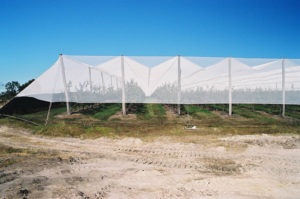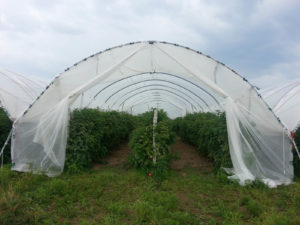
Profit margins are tight for a lot of industries, but this is especially true in the agricultural arena, where profits can be wiped out—in some cases virtually overnight—by events beyond the control of growers and producers. Consequently, pricing has become a huge concern for all involved, say manufacturers of fabric agricultural products designed to mitigate or prevent some of the challenges this market faces, such as netting, shade systems, grain/silage covers.
“In most cases, pricing is a factor in our customer’s decision-making,” says Gretchen Fix, vice president of marketing for Gale Pacific Limited. “So we’re continuously looking to improve our manufacturing efficiencies to supply end products as cost effectively as possible for our customers.” Headquartered in Melbourne, Victoria, Australia, with U.S. headquarters in Altamonte Springs, Fla., Gale Pacific manufactures screening and shading products for the agriculture arena and others.
Cosner Manufacturing, a Lake Wales, Fla.-based cut-and-sew operation specializing in animal shade and produce harvesting products, has invested in specialized equipment that helps the company lower costs, speed up production and reduce waste, says owner Michael Ciferri Jr. He’s protected somewhat from price-shopping customers by the fact that many of those looking for shade systems require customized solutions.
“But even when we lose, we tend to get their business back,” he says. “There’s more to these products than just price; they’re simple but not that simple.”
Investing in more efficient technology is one tactic manufacturers are pursuing; the other strategy is staying continuously innovative. Consider Tek-Knit Industries. Located in Mont-Royal, Quebec, Canada, the manufacturer provides netting, shade, fencing and other barrier/protection products to a variety of markets, including the agricultural industry.

“We are constantly working with the academic and scientific communities to develop and create the best possible solution to any problems nature decides to throw at us,” says Jason Storozum, who handles sales and marketing for the company. “Among others, one of the advancements was the development of our 80-gram insect netting and recently, our 45-percent white shade cloth.” Their outdoor products, incorporating USA-made extruded high-quality monofilament yarn, are fully NAFTA compliant, he adds.
Gale’s recent advancements include the use of diamond lock-stitch with four-yarn crossover in its knitted and netting products, says Kim. “This deters even the smallest birds and protects crops against damaging hail storms,” she explains. “They’re knitted using strong high-density polyethylene fabric that won’t rot or absorb moisture.” The product, Quad Crossover, also promotes plant growth by creating micro-climates and helps save water by reducingpolyfabric products and spray drift.
Along with everything else, end users have also become more concerned about green manufacturing processes and requiring that companies substantiate these claims as the demand for healthy and sustainable products continues to grow—factors also driving their research efforts, says Kim.
“We’ve started trialing a recycling program in Australia with one of our polyfabric products, Landmark 340,” she says. “This recycling trial is a first for Gale, and we look forward to developing sustainable solutions across other product ranges in the future.”
Pamela Mills-Senn is a freelance writer based in Long Beach, Calif.
 TEXTILES.ORG
TEXTILES.ORG


